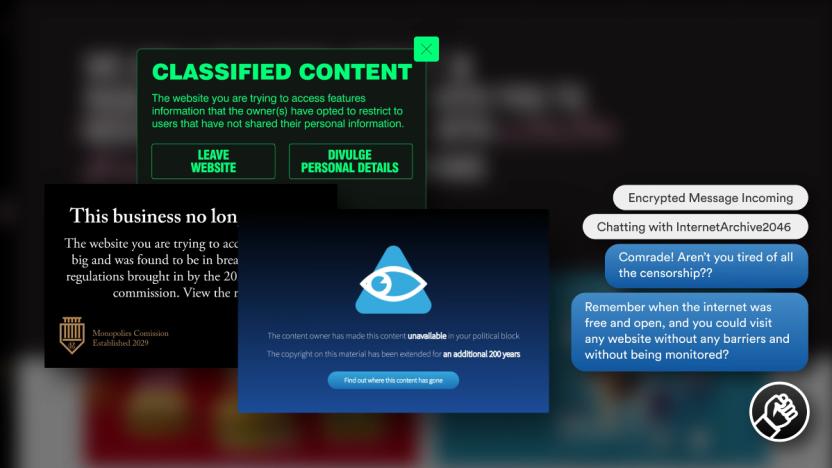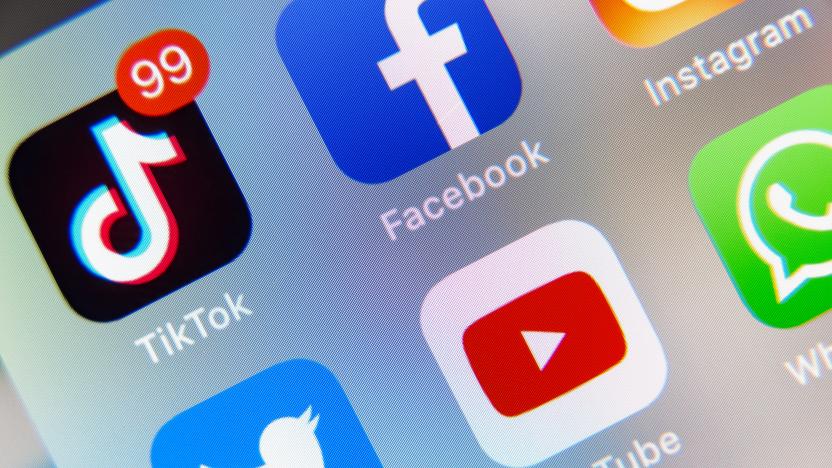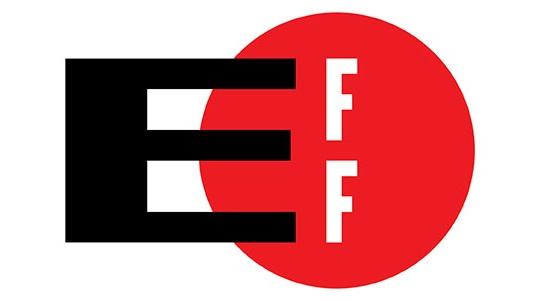Electronic Frontier Foundation
Latest

US Copyright Office provides a path to allow for more device repairs
The US Copyright Office recommended new exemptions to Section 1201 of the Digital Millennium Copyright Act as it relates to the repair of consumer electronics.

The Internet Archive's 'Wayforward Machine' paints a grim future for the web
The nonprofit is marking its 25th anniversary by advocating for internet freedom.

GitHub revamps copyright takedown policy after restoring YouTube-dl
GitHub has reinstated YouTube-dl after it took down the tool last month.

Google, Reddit execs to speak at House hearing on internet moderation
American politicians have been questioning whether internet companies should be held liable for the content they allow, and two of those companies will soon address those concerns directly. Two House subcommittees are holding a joint online content moderation hearing on October 16th where Google IP policy head Katherine Oyama and Reddit CEO Steve Huffman (above) will speak as witnesses. The hearing will both explore existing practices and help determine if customers are "adequately protected under current laws," including the Communications Decency Act's Section 230 safe harbor protections.

EFF is building a stronger 'Do Not Track' browser setting
Despite "Do Not Track" being a standard option on Firefox, Chrome and Safari (but not Microsoft Edge), many unscrupulous advertisers are still secretly tracking the browsing habits of internet users. That's why the Electronic Frontier Foundation has teamed with Adblock, Medium, Mixpanel and DuckDuckGo to create a stronger standard.

Humble Bundle milestones: $50M to charity, $100M to devs
Humble Bundle has raised more than $50 million for charity since launching its first sale in May 2010 – the Humble Indie Bundle, as it was called back then. That bundle introduced the idea of "pay what you want" pricing and offered customers power over the allocation of their payments, plus the chance to do something good for charity. Specifically for that first promotion, it was the Electronic Frontier Foundation and Child's Play Charity. "When my co-founder Jeff [Rosen] first contacted the Electronic Frontier Foundation and Child's Play for our first promotion, no one knew who we were," Humble co-founder John Graham tells Joystiq. "After pitching the confusing idea, in probably too much detail, he was cut off: 'So let me get this straight, you are basically asking if you can give us money? Sure!'" Humble Bundle now supports a roster of more than 50 charitable organizations and has expanded with weekly bundles, ebook bundles, mobile bundles and the Humble Store, which by itself raised $1 million for charity by June 2014. That very first Humble Bundle raised roughly $400,000 for charity – $200,000 each for EFF and Child's Play – at the time an "incomprehensible" amount to John Graham. "It produced a lot of pressure to keep going," he says. "Our potential to raise another $400,000 for charity felt like a moral obligation. Raising more than two orders of magnitude beyond that goal was not something we ever considered."

EFF petitions US government to resurrect abandoned games
The Electronic Frontier Foundation filed a petition to the Library of Congress and the United States Copyright Office this week over the modification of abandoned games, particularly those that require an online connection to prevent piracy. The EFF is seeking a change to current laws that would deem mods that strip out authentication checks as fair use of the software after developers take those servers offline. The foundation noted Civilization 5 and Mario Kart Wii as examples in its petition, though the list of eligible abandoned games goes back many years. Should the Library of Congress approve the request, legally-acquired copies of many of those games would be open to modification so players can enjoy them on third-party servers. The petition does note that MMOs and "persistent world" games would be exempt from the change, as their "audiovisual content is primarily stored on the developer's server and not in the client." [Image: Electronic Frontier Foundation]

Secure Messaging Scorecard gives you a look at which apps keep your info private
When you consider just how much of our personal information if used, scanned, and sold by the companies who provide our email and social media, it's understandable people are worried about online security. The issue has brought about a wave of apps which market themselves as secure messaging options, but exactly how secure are they? The Electronic Frontier Foundation has put together a Secure Messaging Scorecard to provide a better idea of exactly which messaging tools and apps are actually secure, and the results are interesting. Apps are judged by a number of different parameters for messages including: Encrypted in transit Encrypted so the provider can't read it Can you verify contacts' identities Are past communications secure if your keys are stolen Is the code open to independent review Is security design properly documented and Has the code been audited Of the apps surveyed only TextSecure and CryptoCat managed a perfect score across all parameters, but Apple's iMessage service also ranked highly. The only two areas the service was marked down on were "can you verify contacts' identities" and "is the code open to independent review." If you have questions about iMessage's security it's nice to know that it scored better than a number of services which like to rest specifically on their security laurels. To read the Electronic Frontier Foundation's complete report, as well as details about their methodology, head over to their website.

EFF wants to legalize tinkering with shuttered online games
The Electronic Frontier Foundation is seeking six exemptions to the Digital Millennium Copyright Act, one of which may affect your enjoyment of video games and possibly MMOs at some point in the future. In a nutshell, the EFF wants to legalize tinkering with titles which have had their online functions terminated. "The fair use doctrine enables the manipulation and copying of software code in order to gain access to the ideas and functions embedded within it that are not protected by copyright, including server communication protocols," the EFF says. Unfortunately for MMO emulator fans, the petition doesn't apply to "persistent world" titles at present.

The TUAW Daily Update Podcast for May 16, 2014
It's the TUAW Daily Update, your source for Apple news in a convenient audio format. You'll get some the top Apple stories of the day in three to five minutes for a quick review of what's happening in the Apple world. You can listen to today's Apple stories by clicking the player at the top of the page. The Daily Update has been moved to a new podcast host in the past few days. Current listeners should delete the old podcast subscription and subscribe to the new feed in the iTunes Store here.

EFF heaps praise on Apple for protecting customer data
A new and extensive report from the Electronic Frontier Foundation (EFF) details which of the major Internet companies "have your back" when it comes to protecting user data from Government requests. When the dust settled, Apple was one of only a few companies to earn six stars across the board. The worst performer, without question, was Snapchat -- which earned just a lone star. In compiling the results, EFF looked at six distinct company practices and policies. 1. Require a warrant for content of communications 2. Tell users about government data requests 3. Publish transparency reports 4. Publish law enforcement guidelines 5. Fight for users' privacy rights in courts 6. Publicly oppose mass surveillance. Apple in particular was singled out for making tremendous strides regarding its efforts at protecting customer data. The report highlights Apple this year earned a perfect six out of six stars, a huge improvement from previous years when the company earned only one star. Apple earned credit in all 6 categories in this year's Who Has Your Back report. Apple's rating is particularly striking because it had lagged behind industry competitors in prior years, earning just one star in 2011, 2012, and 2013. Apple shows remarkable improvement in its commitments to transparency and privacy. Other companies who earned six out of six stars include CREDO Mobile, Dropbox, Facebook, Google, Microsoft, Sonic, Twitter, and Yahoo. The entire report is thorough and well worth a read for anyone curious about which companies are doing the most to protect their from government requests.

Contact-Congress simplifies the act of, well, contacting congress
If you've never contacted your congress person then you might not realize how difficult our politicians have made it to get a hold of them. There are 535 members of the House and Senate all whom have some arcane contact form on their websites that obscure their direct email address. It's inconvenient for a single person to write a letter to all their elected representatives. But for organizations looking drive letter writing campaigns it's a nightmare. Individuals won't want to visit three separate sites as part of a push to pass or block a piece of legislation. And while there are services out there that can automate part of the work by routing messages to the right email addresses, they charge thousands of dollars a year for access to their tools and databases.

10 tech non-profits worth donating to before 2014
Granted, the holidays didn't exactly leave us flush with cash, but as every charity we've ever contributed to has reminded us via e-mail over the past couple of days, the year is drawing to an end, which means we're running out of time to rack up those tax deductions. And what better way to do that than by donating to a cause you really believe in? In the seasonal spirit of not entirely altruistic giving, we've asked our editors to suggest some of their favorite non-profit tech organizations. Sure there's an endless list of non-tech orgas we could have included like, say, The Red Cross, the Humane Society or even the first amendment defending Comic Book Legal Defense Fund, but for the sake of brevity -- and staying comfortably within our own wheelhouse -- here's a list of tech non-profits to get you started. If we skipped one of your favorites, feel free to add it in the comments below.

Live from Expand: Know Your Digital Rights
Patents, digital rights, the NSA -- it's a lot to wrap one's head around. Thankfully, we've got some of the most knowledgeable folks in the biz, including the Electronic Frontier Foundation's Julie Samuels, Techdirt's Mike Masnick and American University Washington College of Law professor Michael Carroll. November 10, 2013 1:15:00 PM EST Follow all of Engadget's Expand coverage live from New York City right here!

The Engadget Show 45: Security with Cory Doctorow, John McAfee, Microsoft, the EFF and more!
Welcome to the wild world of security and surveillance. From CCTV to massive government spying initiatives, there's no escaping it. Recent high-profile leaks have served as a sobering reminder of just how present it is in all of our lives, so we figured what better time to take a deep dive? We kick things off with one of the strangest (and raciest) segments in Engadget Show history: a visit to the set of John McAfee's latest web video. The one-time security software guru and fugitive discusses the state of antivirus, bath salts and offers some unsolicited advice to Edward Snowden, one exile to another. Trevor Timm of the Electronic Frontier Foundation sits down for an animated discussion of recent NSA surveillance revelations, including a breakdown of which major tech companies are doing right by their user base. Boing Boing editor, sci-fi author and privacy activist Cory Doctorow climbs a tree in San Diego to discuss Wikileaks, the NSA, the "surveillance state" and more. "Edward Snowden is a hero," he begins, not speaking on behalf of the EFF, mind you -- and things get really good from there. Cryptographer and computer security specialist Bruce Schneier also chimes in on wiretapping, whistleblowing and "security theater." Next up, we pay a visit to The New Yorker's midtown office to talk Strong Box, the magazine's secure deposit box for anonymous whistleblowers. The team behind Ubisoft's Watch Dogs joins us to discuss partnering with computer security company Kaspersky to bring a realistic portrait of the world of hacking to its much anticipated title. And one-time hacker turned head of security community outreach at Microsoft, Katie Moussouris, discusses Redmond's Bluehat bounty program and working with the hacking community to build safer software. All that, plus the usual prognosticating from resident philosopher John Roderick in this month's Engadget Show, just after the break.

The Engadget Interview: EFF's Julie Samuels talks patents, podcasting and the SHIELD Act
We've heard it shouted from the mountaintops more times than we'd care to mention: the patent system is fundamentally broken. But that manner of righteous indignation can often fail to make an impression on those attempting to live their lives unaffected on the sidelines, as hardware behemoths level a seemingly endless string of suits based on often overly broad language. One's perspective shifts easily, however, when targets change and the defendants themselves are no longer aggressively litigious corporations with an arsenal of filing cabinets spilling over with intellectual property, as was the case when one company used a recently granted patent to go after a number of podcasting networks. When we wanted to get to the bottom of this latest example in a long line of arguably questionable patent litigation, we phoned up Julie Samuels, a staff attorney at the Electronic Frontier Foundation who has also been designated the organization's Mark Cuban Chair to Eliminate Stupid Patents. Samuels has been fighting the battle against dangerously broad patents for some time now, recently traveling to DC to support passage of the SHIELD Act (Saving High-tech Innovators from Egregious Legal Disputes), a congressional bill that would impose heavy fines against so-called patent trolls. We spoke to Samuels about supposed trolls, podcasts, SHIELD and how those with microphones can make their voices heard. Note: The owner of the podcasting patent in question declined to comment on the matter.

Live from the Engadget CES Stage: an interview with the EFF's Julie Samuels (update: video embedded)
The topic no one wants to talk about at CES? Yep, it's gonna be a half-hour of frank patent litigation talk with the Electronic Frontier Foundation's Julie Samuels. If you care at all about legal kerfuffles, you're not gonna want to miss this one. January 9, 2013 5:30 PM EST Check out our full CES 2013 stage schedule here! Update: video embedded

DMCA update shuts down new phone unlocking next year, allows rooting (but not for tablets)
And so it passed that Congress didst layeth its blessing on the jailbreaking and rooting of all manner of devices; the hacking community saw the miracle and rejoiced. But that amendment to the DMCA two years ago was just a temporary exemption and the Electronic Frontier Foundation has been vigorously lobbying to get it reinstated. The Library of Congress has now done just that through a new three year extension, but with some serious caveats: After 90 days, unlocking of new phones will be verboten and all tablet mods will still be illegal. This differs from the 2010 decision which did allow unlocking, because the Librarian decided that a recent copyright ruling means fair use rules no longer apply to a handset's OS. It also said the exception isn't needed anymore because carrier rules regarding unlocking are now more liberal -- although the lawmaker may be confounding chicken with egg by that reasoning.

Federal appeals court says warrantless wiretapping is legal
A federal appeals court has ruled today that the US government can tap into Americans' communications without worrying over frivolous things like "being sued" by its people. In what most sane civilians will probably see as a depressing loss of protection, a three-judge panel of the 9th US Circuit Court of Appeals ruled that citizens can sue the United States for damages stemming from the use of information collected via wiretap, but not for the collection of information itself. In typical pass-the-buck fashion, Wired reports that Judge Michael Daly Hawkins and Judge Harry Pregerson added the following: "Although such a structure may seem anomalous and even unfair, the policy judgment is one for Congress, not the courts." Alrighty. For those unaware, the back and forth surrounding this issue extends back to Congress' authorization of the Bush spy program in 2008, and more specifically, a pair of US lawyers and the now-defunct al-Haramain Islamic Foundation -- a group that was granted over $2.5 million combined in legal fees after proving that they were spied on sans warrants. The full report can be found in the PDF below.

MPAA may let Megaupload users retrieve non-infringing files, does it for the Armed Forces
Megaupload's still immersed in hot water, but there are signs the legal temperature could be cooling... slightly. Don't breathe a sigh of relief just yet though, as a significant portion of that confiscated cache of cloud-stored files remains somewhat indefinitely under lock and key. A minor reprieve may be on the way, however, owing to a much more "sympathetic" MPAA which has asked the court to consider releasing non-illegally obtained content to previous users. And lest your evil eye be trained too heavily upon the Hollywood group behind the shutdown, the association's made it quite clear that, under the site's TOS, users were never guaranteed continued access to uploaded content anyway. The change of heart comes in response to a motion filed by the Electronic Frontier Foundation, on behalf of a member of the U.S. military, petitioning the return of personal, non-IP infringing files. According to the now-defunct site's founder Kim Dotcom, that group of "legitimate" users comprised nearly 16,000 accounts utilized primarily to share photos and video with far away family and friends. Of course, should this retrieval request be granted, a requisite procedure will need to be put in place to filter out copyrighted media -- a system that's sure to pose countless headaches for those involved. Nothing's yet been decided so, for now, the fate of your lost files rests firmly in the court's hands. Such are the perils of the cloud.














